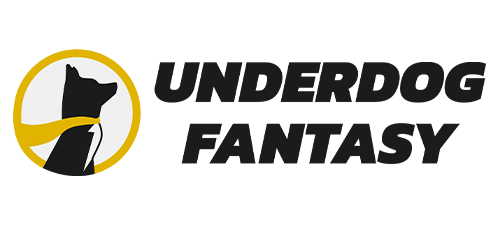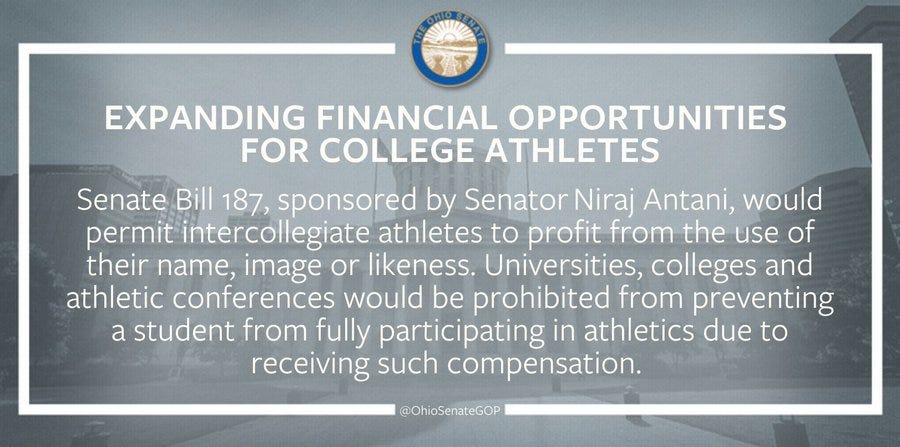How NIL Collectives Are Changing The Game
Welcome to Blue Chip Journal by Adam Breneman - a weekly newsletter from Adam with analysis, hot takes and news on all things college football, NIL and recruiting.
Subscribe now and join 22,000 other sports fans and share this newsletter with all the college football fans you know!
This email is sponsored by…
I am partnering with Underdog Fantasy to sponsor my content for football season!
Underdog Fantasy is the EASIEST place to play fantasy football. Draft your team with NO in-season management, get the optimal score each week of the season, and have a shot at over $10 MILLION in total prize money in their Best Ball Mania 3 contest.
Click the button below to download the Underdog Fantasy app and Underdog is going to match your first deposit up to $100! ⬇️
Hey friends,
Incredibly, it’s already been over a year since the NCAA announced its interim Name, Image, and Likeness (NIL) policy.
While the overdue legalization process has benefited athletes through unprecedented monetization models, most Power Five schools have focused on jump-starting collectives to help students better navigate potential earning opportunities within the space
Although thousands of athletes are benefitting from the formulation of supporter-backed collectives, even the most knowledgeable college football fans are unsure of how collectives originally came to be, how they operate, and how they remain in line with legality.
In simplest terms, NIL collectives are business entities formed by boosters to generate and pool revenue for future athlete-based business endeavors.
Typically, NIL collectives aren’t directly sanctioned by university-employed officials. At most Power Five programs, the combination of former players and abundant alumni bases have led the charge in recruiting current athletes to commit to their long-term earnings models.
But, there’s a catch — each collective MUST operate in accordance with statewide NIL laws, which vary based on campus location.
Let’s put some context into this:
On June 16, 2021, the Ohio Senate unanimously approved Bill-187, allowing student-athletes within state lines to profit off of their name, image, and likeness through sponsored social media posts, third-party endorsements, and personal appearances.
Less than two weeks later, the bill was proposed to the House of Representatives and entered into law on July 1.
The quick legal turnaround allowed Ohio State supporters to receive a headstart on building well-funded collectives to attract high-performing university athletes.
Within days, Columbus-based real estate tycoon Brian Schottenstein teamed up with former Buckeye quarterback Cardale Jones to create “The Foundation” — a third-party collective that formally launched in April.
Because of the state of Ohio’s specific NIL laws, the collective’s financial set-up is unique and intelligent.
Schottenstein and Jones are one of the few NIL collectives that run as a non-profit organization.
Although this seems like a loophole, let’s take a look at the company’s mission statement:
“Our Mission: The Foundation was founded with the goal of using the Name, Image, and Likeness of Ohio State student-athletes to help promote worthy charitable causes and make positive contributions to our local communities.”
At The Foundation, Ohio State supporters can make tax-deductible charitable contributions through its 501C3 structure. In turn, a portion of the collective’s proceeds will go towards player appearances at three partner charities.
This week, the Columbus Dispatch reported that the collective has raised “more than half a million dollars” to fund a joint NIL deal for four Ohio State players, with most of the funding coming directly from fans and alumni.
The reported figure, which amounts to $550,000, will be split among the squad’s biggest stars, including CJ Stroud, Treveyon Henderson, Jaxon Smith-Njigba, and Denzel Burke.
Within the terms, Stroud and Njigba will appear in advertising campaigns for Designer Shoe Warehouse, with Burke and Henderson joining forces to promote American Eagle Outfitters. Additionally, Stroud will help with Value City Furniture’s upcoming marketing campaign.
But, within the terms, all four superstars must be in attendance at a charitable fundraising event held on August 22 in conjunction with LifeTown — a group that supports children with special needs.
Moreover, each player will be given the chance to interact with children from A Kid Again, an organization that impacts children who suffer from life-threatening conditions.
The deal marks the largest joint NIL deal in Ohio State history, with The Foundation at the forefront of the terms.
While there are currently 85 supporter-back collectives in effect nationwide, few have operated as smoothly as The Foundation.
With that in mind, it’s also important to consider that only 29 states have passed NIL laws. But, for less than half of the states that haven’t taken the next step, few programs are taking the risk of being left behind.
Let’s explore Utah’s stance on NIL as an example.
Currently, the state of Utah has no proposed legislation regarding NIL laws for its colleges and other higher education institutions.
But, this hasn’t stopped the University of Utah from taking unique strides toward keeping its athletic programs competitive in the NIL space — with football standing as the driving force.
Despite the state’s lack of legislation, student-athletes can still take advantage of potential NIL opportunities under the NCAA’s interim policies.
However, it would be illegal for high school prospects to inquire about future NIL endeavors without being under the NCAA’s umbrella of legality prior to enrollment.
Because of this, it is much harder for the University of Utah to pitch booster-based collectives on the recruiting trail as potential growth opportunities once arriving in Salt Lake City. After all, it would be illegal to do so.
In response to the adverse situation, the University of Utah recently rolled out the “Elevate U” initiative, which has coined the tagline “Your game. Your brand. Your future
Utah is one of few programs that is using a university-backed initiative that stems from its academic resources as its driving NIL pitch.
Elevate U is offered to all Utah student-athletes, removing barriers from sport or gender restrictions seen in other booster-led deals.
Here’s Elevate U’s mission statement:
“The Elevate U program will equip you with the most comprehensive toolbox to make the most of your name, image, likeness, and business ideas. This exclusive program is offered to all Utah student-athletes in partnership with the David Eccles School of Business and top-10 nationally ranked Lassonde Entrepreneur Institute.”
Moreover, the unique opportunity fostered by Utah athletics connects current students with notable Utah alumni and community members to build brand recognition and business advancements.
While Utah’s program is certainly uncommon, it arguably encompasses what NIL initiatives and collectives should be modeled after across the county.
Instead of simply placing earnings at the mission’s forefront, Elevate U helps empower, connect, and protect the Name, Image, and Likeness of each student while gifting players invaluable career advice throughout the process.
So, after exploring two vastly different ends of the spectrum, what are your thoughts on NIL collectives?
Is it appropriate or morally acceptable to entice fans into making charitable donations for the end goal of player compensation?
Or, should more programs adopt Utah’s model and put the well-being of the students in the hands of the athletic departments rather than in the pockets of alumni bases?
Let me know on Twitter @AdamBreneman81 or in the comments below!
- Adam Breneman with Connor Krause
My Article of the Week:
Notre Dame targeting $75 million annual media rights payout in quest to remain independent — CBS Sports
It’s no secret that Notre Dame is protective of its conference independence. With the Big Ten’s shared revenue value set to skyrocket over the next two years with the additions of USC and UCLA, the Fighting Irish have been rumored to be commissioner Kevin Warren’s next top target.
However, Notre Dame’s athletic department and administration seemingly have other ideas. CBS Sports’ Dennis Dodd recently reported that the university would prefer to remain independent if it can earn at least $75 million annually in media rights revenue from its current partner, NBC.
While the $75 million figure would be on par with the value Big Ten and SEC programs will ultimately receive, the astounding amount is incomparable to the $15 million annual deal Notre Dame currently holds with NBC.
To warrant the $60 million increase, NBC is reportedly seeking weekly “shoulder programming” to show other college football games on its network both before and after Notre Dame’s marquee matchup.
With the Big 12’s current media rights deal set to expire in 2025, the conference has emerged as a “strong option” to fulfill the network’s programming desires as NBC’s main partner.
The Big Ten, which is set to announce a $1 billion media rights deal with Fox at the end of the month, is also seeking two to three other prospective television partners. According to Dodd’s reports, NBC is also interested in becoming one of its remaining bidders.
Notre Dame’s fate should hold more clarity over the next two to three weeks during NBC’s negotiation period. To learn more, check out Dodd’s full piece from CBS Sports below.
If you have any questions, comments, or feedback, please don’t hesitate to reach out to me by email at adam@brenemanmedia.com.
You can also find me on Twitter, Instagram, TikTok, LinkedIn or Facebook.
Shoutout to Connor Krause for helping to write this newsletter and putting the whole thing together!












